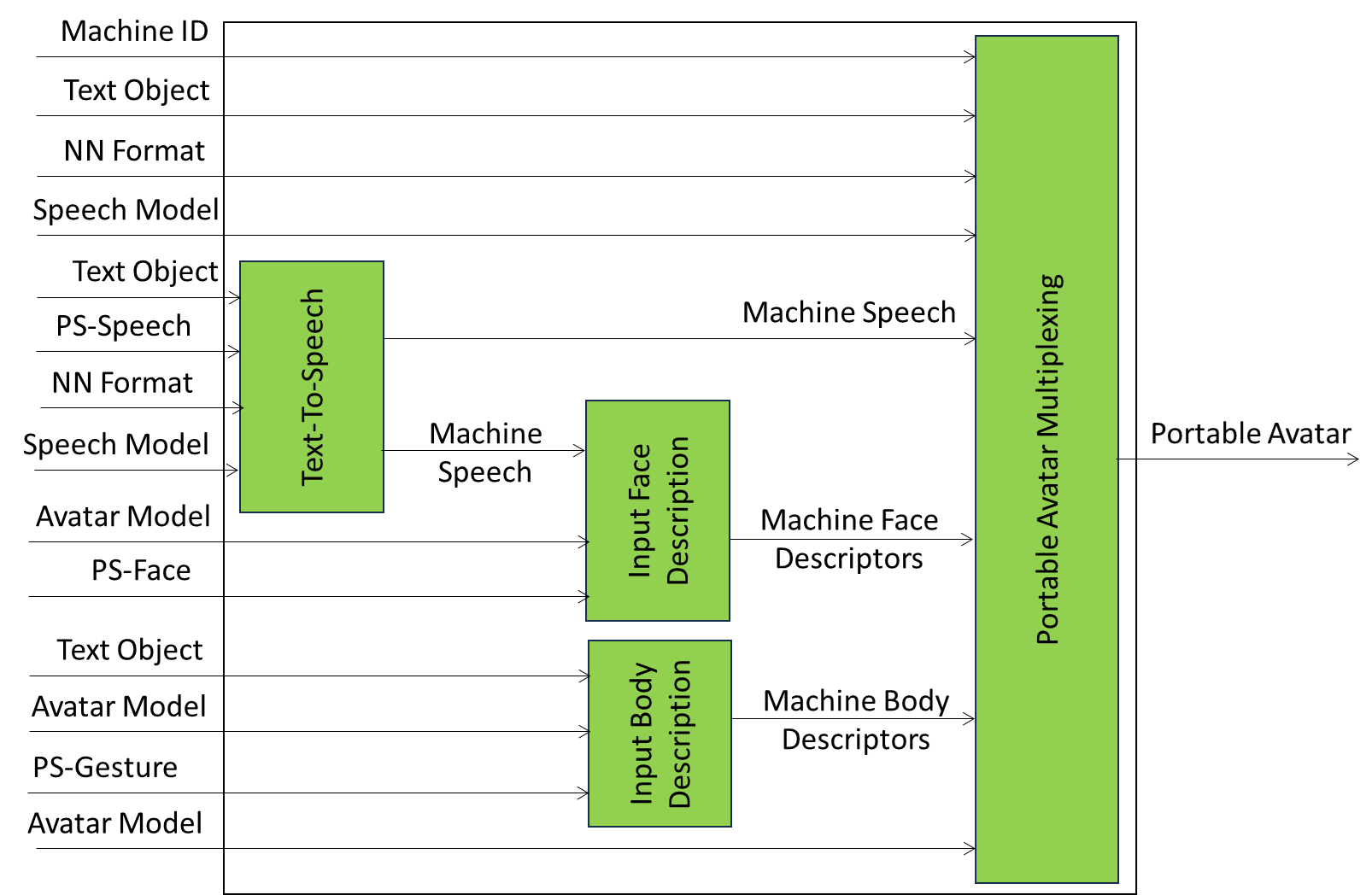1 Functions of Personal Status Display
2 Reference Model of Personal Status Display
3 I/O Data of Personal Status Display
4 Functions of AI Modules of Personal Status Display
5 I/O Data of AI Modules of Personal Status Display
6 AIMs and JSOM Metadata of of Personal Status Display
1 Functions of Personal Status Display
Personal Status Display (PSD) is a Composite AIM receiving Text, Personal Status, Speech Model and Avatar Model and generating the Personal Avatar with Face and Body Descriptors of an Avatar producing Text and uttering Speech with the intended Personal Status while the avatar’s Face and Gesture show the intended Personal Status. The Personal Status driving the avatar can be extracted from a human or can be synthetically generated by a machine as a result of its conversation with a human or another avatar. Several Use Cases from MPAI-MMC and other MPAI standards use this Composite AIM as a replacement for the combination of the AIMs depicted in Figure 1.
2 Reference Model of Personal Status Display
Figure 1 depicts the AIMs required to implement Personal Status Display.

Figure 1 – Reference Model of Personal Status Display
The Personal Status Display operates as follows:
- Avatar ID is the ID of the Portable Avatar.
- Machine Text is synthesised as Speech using the Personal Status provided by PS-Speech using a Speech Model.
- Machine Speech and PS-Face are used to produce the Machine Face Descriptors.
- PS-Gesture and Text are used for Machine Body Descriptors using the Avatar Model.
- Portable Avatar Multiplexing produces the Portable Avatar.
3 I/O Data of Personal Status Display of Personal Status Display
Table 1 gives the Input/Output Data of Personal Status Display.
Table 1 – I/O Data of Personal Status Display
| Input data | From | Description |
| Avatar ID | Upstream AIM | Portable Avatar’s ID |
| Avatar Model | From upstream AIM or embedded | Part of Portable Avatar |
| Text Object | Keyboard or upstream AIM | Texts accompanying Portable Avatar |
| NN Format | From upstream AIM | 0=NNEF 1=ONNX |
| Speech Model | From upstream AIM | Neural Network Speech Model |
| PS-Speech | Personal Status Extraction or Machine | To synthesise Speech |
| PS-Face | Personal Status Extractor or Machine | To describe Face |
| PS-Gesture | Personal Status Extractor or Machine | To describe Body |
| Output data | To | Description |
| Portable Avatar | Downstream AIM or renderer | As Portable Avatar |
4 Functions of AI Modules of Personal Status Display
Table 2 gives the functions of the AIMs.
Table 2 – Functions of AI Modules of Personal Status Extraction
| AIM | Functions |
| Text To Speech | Synthesises Text with Personal Status. |
| Input Face Description | Produces the Machine Face Descriptors with Personal Status. |
| Input Body Description | Produces the Machine Body Descriptors with Personal Status. |
| Portable Avatar Multiplexing | Multiplexes Data into Portable Avatar with Personal Status. |
5 I/O Data of AI Modules of Personal Status Display
Table 3 gives the list of AIMs with their functions.
Table 3 – AI Modules of Personal Status Extraction
| AIM | Receives | Produces |
| Text To Speech | Text NNFormat Speech Model PS-Speech |
Machine Speech |
| Input Face Description | Avatar Model Machine Speech and PS-Face |
Machine Face Descriptors |
| Gesture Description | Avatar Model Text and Machine PS-Gesture |
Machine Body Descriptors |
| Portable Avatar Multiplexing | Avatar ID Machine Text Machine Speech Machine Body Descriptors Machine Face Descriptors Machine Avatar Avatar Model NNFormat Speech Model |
Portable Avatar |
6 Specification and JSON Metadata of Composite AIM and its AIMs
The AIMs in italic are not fimal.
Table 6 – Acronyms and URs of JSON Metadata
| AIMs | Name and Specification | JSON | |
| PAF-PSD | Personal Status Display | X | |
| – | MMC-TTS | Text-to-Speech | X |
| – | PAF-IFD | Input Face Description | X |
| – | PAF-IBD | Input Body Description | X |
| – | PAF-PMX | Portable Avatar Multiplexing | X |

